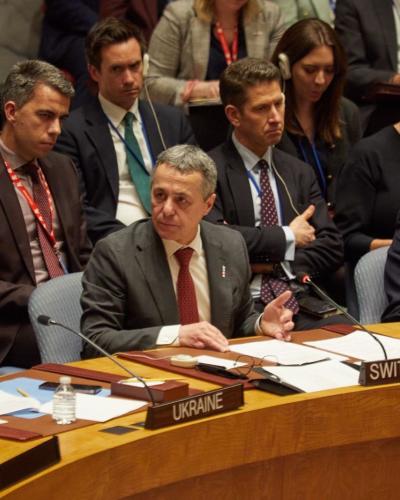The worsening food crisis facing the population of the Gaza Strip was at the focus of a UN Security Council meeting today. The meeting was convened at the request of Switzerland and Guyana in their roles as the Council’s co-focal points on "Hunger and Conflict". According to information from the UN Humanitarian Office (OCHA), the level of food insecurity and the associated risk of famine in the Gaza Strip is alarming. The escalation of hostilities in the Middle East since October 7 is the main cause of this acute need. The fighting is negatively impacting Gaza’s water supply, agriculture and food. The situation was already worrying due to the poverty that has prevailed since the closure of the Gaza Strip in 2008, which restricted movement and access. According to OCHA, one in four people in Gaza is now severly malnourished – more than half a million people. Children, pregnant and breastfeeding women, people with disabilities, and the elderly are at a particularly high risk of death.
The dramatic situation is exacerbated by the severe restrictions on the transport of food into and within the Gaza Strip. In the Security Council, Switzerland reminded Israel to implement the measures ordered by the International Court of Justice on February 26, 2024. Among other things, the Court requires Israel to ensure the provision of urgently needed basic services to the Palestinian population and to facilitate the rapid and unhindered humanitarian aid. Against this background, Switzerland called on all parties to the conflict to comply with international humanitarian law, including the prohibition of the use of starvation as a method of warfare, and to protect the civilian population.
"We, the members of this Council, must use our influence and take measures to prevent famine and save lives," emphasized Switzerland's representative to the Security Council. An immediate humanitarian ceasefire is urgently needed. In Resolution 2417 of 2018, the UN Security Council strongly condemned the starvation of civilians and the unlawful denial of humanitarian access as a tactic of war. Switzerland stated in the Council that it remains ready to work with all members of the Council to find a political solution that ends the suffering of the people and restores the prospect of peace.




